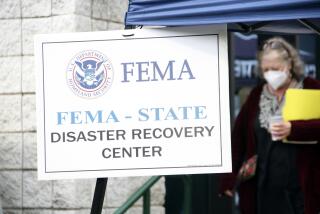Floyd Feels Like a Wash to N. Carolinians
- Share via
OGDEN, N.C. — After the banshee wind and all-night vigils, squads of frogs that hopped out of the woods, candlelight dinners of Slim Jims and Mountain Dew and the rain that streaked upward like some Ripley’s Believe It or Not trick, the morning after seemed a hollow prank.
The sun was out for the first time in three days. The air was still. Wrens and sparrows chirped. Hurricane Floyd had left the eastern Carolinas a flooded, partially paralyzed mess, but otherwise proved to be a blustery 400-mile-wide weakling.
So Jeff and Stacey Webber, blinking at the eerie quiet around them, strapped their 9-month-old daughter, Toni, in a child carrier and went out for a late morning stroll in this little town just outside Wilmington.
“Big monster, right,” Jeff Webber scoffed, kicking blasted pieces of downed pine. “Now don’t get me wrong. We lost a section of fence and got some power lines down. But tell you what--a lot of people waking up today gonna feel pretty dumb for running.”
Carolina coast people don’t like runners. They don’t like to be runners. It’s a badge of gumption here to sit out the howling winds with a six-pack and a radio. But Floyd approached with an alarming advance billing that dwarfed most of the storms that have blown through here in recent years, then meekly blew on through with winds that seemed to waver after the first bruising assault. The storm’s hurried feint left some of the thousands of beach dwellers who fled wondering Thursday if they had made the right decision--and stewing about being stranded on this balmy day, far from their homes, far from shore.
The Webbers were comfortable with their decision to stay. Even after Jeff Webber, 37, heard the dreaded sound of “trees popping outside” and Stacey, 31, had to rush to comfort her little girl, the couple had no second thoughts about remaining inside their double-wide trailer instead of driving a few miles to the nearest shelter. Voices on the radio kept appealing for trailer park residents to get to safety, but the Webbers felt safe--and that seemed enough.
“Sure, there’s always that worry that the trees might come down on you,” Jeff said. “But we got our privacy, we can eat junk food while the wind’s going, and ain’t no strangers snoring in your face,” Webber said. “I figured I’d take my chances.”
Floyd’s enervated progress made Webber’s blind choice seem almost like wisdom. The hurricane’s approach seemed hesitant even before it advanced on Cape Fear on Wednesday night. As late as 10 p.m. EDT in some areas, the rain that had lashed downward all day suddenly paused and the air stilled. In central Wilmington, bullfrogs sounded, massing out of the woods near Highway 132, a road that had swarmed earlier in the day with cars crawling north but was now deserted.
When the torrent arrived, it battered the Wilmington area for nearly three hours, striking so hard that plumes of mist rose from the ground. Wind gusts were reported as high as 115 mph, and over two days as much as 20 inches of rain fell.
By 3 a.m., the hurricane had already spent much of its force. Its keening winds knocked out power to most of Wilmington’s 60,000 residents, subsided as the 50-mile-wide eye passed overhead, then sputtered on fitfully for several more hours until daybreak. As public safety officials began assessing flooding that created 10-foot-deep sinkholes in roads and covered at least 88 thoroughfares in the state, the refugees were packing up to check on the homes they abandoned the day before.
At one roadside motel, a group of beach refugees pressed up against fogged windows to watch lances of rain driven upward by the shrieking wind. By 10 a.m., the wind was a breeze and they were packing up, primed to run police roadblocks and check on the homes they abandoned the day before.
“We should’ve never left,” a man in a Carolina Panthers jersey barked as he loaded garbage bags of clothes into his pickup truck outside an emergency shelter in North Wilmington. He was headed home with his mother after spending the night at Trask Middle School, bound for the cordoned-off beach town of Topsail Island “come hell, high water, Floyd, Dennis or whoever.”
Nearby, Larry and Elizabeth Jenkins were also loading up for home along with Cody, a German shepherd who snarled from inside their station wagon. The Jenkins--who shelled out $40,000 in repairs after pine trees toppled onto their house when Hurricane Fran ravaged the area in 1996--stood by their decision to retreat inland.
“You suffer a lot, you sure don’t want to go through it again,” said Larry Jenkins, who runs a boiler at an International Paper plant. He even brought his $2,000 tractor-sized lawn mower on a trailer hitched to the wagon, concerned it would suffer the same fate as an earlier mower, which disappeared into Fran’s flood waters.
North Carolina state and local officials have spent years urging coastal residents to act quickly in advance of late summer’s ceaseless spate of hurricanes. Earlier this summer, 6,000 beach people attended a Hurricane Expo sponsored by authorities to drive home the message of caution. And for hours before Floyd’s pinwheel winds struck Cape Fear just before midnight Wednesday, officials from Gov. James B. Hunt Jr. on down to folksy Kure Beach Mayor Betty Medlin begged residents to be responsible and take cover far from the sea’s edge.
“I urge people to get into a safe place, protect your family until it’s over and then pitch in to clean up,” Hunt said.
In many island communities weary after five stinging storms in three years, the message hit pay dirt. “Everyone we know of packed up and took off,” said Jeff Kerr, police chief at Sunset Beach, a town inundated by water.
North Carolina officials said a record number of residents left their homes and thronged into shelters and inns during the hours before Floyd struck. Richard Moore, secretary of Crime Control and Public Safety, said 37,354 crowded into 233 public emergency centers across the state--the most ever in advance of a hurricane.
But in other places, such as Hampstead, a beach-side stretch of 9,000 people north of Wilmington, only 50% evacuated, said volunteer firefighter Kevin Garvey. “We have some bullheaded folks who just don’t want to leave their homes. “Can’t blame ‘em, but it means we spend all night wondering if they’re going to get through it alive.”
Wayman Pittman, 64, a retired hospital security guard who lives with his wife, Alberta, out on the ocean at Whiskey Creek, has no patience left for the ones who stay. He long ago gave up that wild determination to outlast things that are bigger, deadlier and more unpredictable than he is.
Instead of staying lashed to his home like some beachfront Ulysses, he retreated with Alberta to the shelter of the middle school, where he played a mournful accompaniment to the braying winds, softly blowing “Amazing Grace” on his harmonica.
“I’ll tell you the secret of why they stay,” Pittman said, rising from his cot. “They’re drunk!”
“That’s right,” piped up Iris Owens, 76, another displaced gray-head who sat across the aisle. “People don’t understand how precious life is. They’ve got the sense of mules.”
CAPTION
More to Read
Sign up for Essential California
The most important California stories and recommendations in your inbox every morning.
You may occasionally receive promotional content from the Los Angeles Times.










